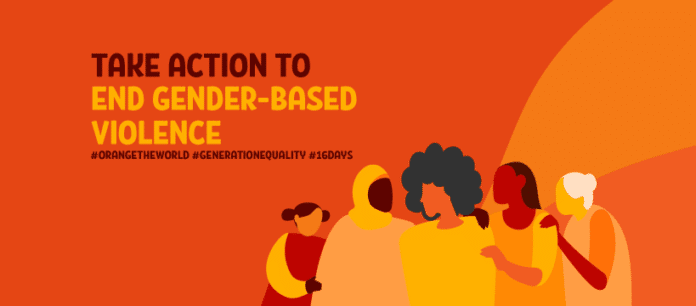As the Covid-19 pandemic earlier this year shut down societies around the world, millions of women and girls faced a dangerous situation: staying home. Before the pandemic one in three women and girls experienced sexual and/or physical violence from an intimate relative, and emerging reports suggest that the pandemic has intensified the number alarmingly.

On 25 November, International Day for the Elimination of Violence against Women, the UN sets out to amplify global action to help survivors and end violence against women.
The Shadow Pandemic
Before the pandemic, according to UN Women, 243 million women aged 15-49 reported that they had experienced sexual and/or physical violence by an intimate partner in the past year. That amounts to 18 per cent. The figures rise to 30 per cent – one in three women – when measured over a lifetime, and emerging reports suggest that the numbers have increased significantly in 2020 as a result of Covid-19. In October, the UN Trust Fund to End Violence against Women issued a study based on reports and data from women’s rights organisations on the front lines. The study shows that all types of violence against women and girls, particularly domestic violence, has intensified during the Covid-19 pandemic.
The worrying tendency is coined the Shadow Pandemic.
The alarming increase in the multiple forms of domestic violence against women and girls is fuelled by security, health and money worries faced by many households around the world, creating tensions and strains accentuated by cramped and confined living conditions during lockdowns.
And while the reports of violence against women continue to increase, disruptions in the health sector have left life-saving care and support for survivors ill-equipped to respond to the Shadow Pandemic.
Virtual violence
Confinement measures and lockdowns have not protected women and girls from attacks from the outside world either.
UN Women reports that where women have access to technology, online violence is increasing. Before COVID-19, one in 10 women in the European Union reported having experienced cyber-harassment since the age of 15 (including having received unwanted, offensive and sexually explicit emails or SMS messages, or offensive, inappropriate advances on social networking sites). Due to restrictions, the use of online platforms has increased this year. This has been used by some as an opportunity to groom young people into exploitative situations.
Millions of women and girls are using videoconferences frequently, sometimes daily, to work and study. According to diverse media outlets, social media posts and women rights experts, different forms of online violence are on the rise including stalking, bullying, sexual harassment, and sex trolling. Examples include unsolicited pornographic videos while they are dialling into a social event via a virtual chat room.
Orange the World: Fund, Respond, Prevent, Collect!
Every year on 25 November, International Day for the Elimination of Violence against Women, the United Nations supports the civil society initiative ’16 Days of Activism against Gender-Based Violence’. The campaign ends on 10 December, Human Rights Day, indicating that violence against women is one of the most pervasive breaches of human rights worldwide.
The theme of the campaign this year is ‘Orange the World: Fund, Respond, Prevent, Collect!’ As in previous years, the campaign includes a call to ‘orange’ the world to symbolize a brighter future for women and girls free from violence. Stakeholders ranging from state authorities, companies and individuals are invited to wear orange, light up buildings in orange or colour their social media platforms in orange.
In addition to the ‘Orange the World Initiative’, this year’s theme aims to mobilise action to Fund (women’s organisations), Respond (to survivors needs), Prevent (by addressing social norms that normalize violence against women and girls) and Collect (data to inform policies and programmes).
Take part in the activism #orangetheworld #16days




